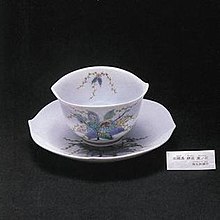|
Kalk Samen Kuri no Hana
Kalk Samen Kuri no Hana (Japanese: 加爾基 精液 栗ノ花),[b] also known as Kalk Samen Chestnut Flower[1] and Chlorine, Semen, Chestnut Flower is the third studio album by Japanese singer-songwriter Ringo Sheena, released on February 23, 2003, on Toshiba EMI / Virgin Music. The album's lead single was a massive success, topping the Oricon charts for the first time in her career. EMI released the album using CCCD at first. Then, the CCCD version was stopped producing, and the CD-DA version was newly released on July 2, 2008. The 2LP vinyl record version was released on May 27, 2003 and contains the bonus track "Fig Flower"[c]. The short film Kaleidoscope: A Short Film[d] acts as a visual accompaniment to the album and was released prior to the album on January 22, 2003. Background and recordingKalk Samen Kuri no Hana was released hot off of the success of Ringo's sophomore album Shōso Strip (2000) as well as her self-cover album Utaite Myōri: Sono Ichi (2002). The album was originally titled Wonderful, Vulgar, Eccentric[e].[f] However, she decided to change the title at the last minute after being intrigued by an argument she overheard between two male staff members on her team, who bickered over whether the smell of semen more resembled the smell of chlorine or the smell of the chestnut flowers. She thought that the nuance of the word "semen" was beautiful, and adapted it to the original title, explaining that "Kalk" (calcium hypochlorite) fit into the original first word of "Wonder", while "Semen" fit "Vulgar", and "Chestnut Flower" fit with "Eccentric".[2] The 2001 single "Mayonaka Wa Junketsu" (真夜中は純潔, Midnight is pure) was to have been included on the album along with one of the single's b-sides, "Aisaika no Choushoku" (愛妻家の朝食, The breakfast of the devoted husband), however these tracks were dropped on the basis of not thematically fitting in with the rest of the album. Kalk Samen Kuri no Hana saw Sheena producing a major release all by herself for the first time in her career, as opposed to working with her usual collaborators and producer Seiji Kameda.[3] The album allegedly took her an extra year to produce than her previous two studio albums did. Sheena chose to not record a band all at once as she had done on previous albums, choosing to instead record one instrument at a time by overdubbing and multitracking and layering the instruments.[3] Musically, the album combines both the standard instrumentation of a rock band as well as various other musical instruments, including folk instruments from Japan and other regions, string instruments, wind instruments, percussion instruments, as well as music sequencer and a full orchestra. In order to reduce budgets, she used her own Macintosh computer and cheap recording equipment to compose and edit the songs by herself using computer software,[3][4] while sometimes exchanging the arranged songs with Uni Inoue.[3] She recorded one musical instrument in one room of her house while recording the ensemble parts (string section, etc.) in another room.[3] Seiji Kameda, who had been involved in the production and arrangement of her previous two studio albums did not participate in the album whatsoever. Instead, Sheena arranged the album with audio engineer Uni Inoue. Toshiyuki Mori orchestrated each of the recorded songs and arranged the entirety of "Yattsuke Shigoto". The song titles and their places in the tracklist continue a pattern seen on Ringo's first two albums where each song title symmetrically parallels the opposite side of the tracklist. For instance, tracks 1 and 11 are written with exactly two kanji, tracks 2 and 10 are written with eight katakana characters, and so on. ReceptionKalk Samen Kuri no Hana was ranked second in CNN International Asia's list of "the 2000s' most under-appreciated Japanese music of the last decade" on December 22, 2009.[5] Sheena also received a mention in The Guardian as one of Japan's artists who "deserve to be seen and heard in the west" in 2010.[6] Track listingAll tracks written by Ringo Sheena; all tracks arranged by Sheena and Uni Inoue (credited as "Bakeneko Killer"), except "Rush Job" by Toshiyuki Mori, and "Fig Flower" by Ukigumo.
Credits and personnel
Track 1 and 11
Track 2 and 10
Track 3 and 9
Track 4 and 8
Track 5
Track 6
Track 7
Track 12
Notes
References
External links
|
|||||||||||||||||||||||||||||||||||||||||||||||||||||||||||||||||||||||||||||||||||||||||||||
Portal di Ensiklopedia Dunia
